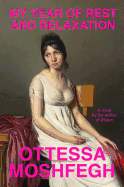
It's 2000, and the unnamed narrator of My Year of Rest and Relaxation seems to have it all: an apartment on Manhattan's Upper East Side, an easy gig at an art gallery and an inheritance to sustain her. She's beautiful, even on bad days ("like a young Lauren Bacall the morning after"). But those are the only days she has. At 24, she's lost both of her parents and, with the exception of trips to the corner bodega to get bad coffee, her interactions with the world are limited to three people. And those connections grow tenuous and troublesome as she embarks on a year of hibernation.
There's Trevor, her on-and-off (but mostly off) boyfriend who occasionally surfaces for sex. There's Reva, her only friend, whose loyalty and devotion are offset by neediness and envy. And there's Dr. Tuttle, a remarkably disreputable doctor who dispenses prescription drugs without a second thought. All the narrator wants to do is sleep. "I was growing less and less attached to life. If I kept going, I thought, I'd disappear completely, then reappear in some new form. This was my hope. This was the dream." When sleep is replaced by days of insomnia, Dr. Tuttle prescribes Infermiterol. Sleep arrives in three-day blocks; so do blackouts and bizarre behavior she can't account for.
With My Year of Rest and Relaxation, Ottessa Moshfegh (McGlue, Eileen) has created a character whose detachment is so profound she often hears herself saying things, as if caught by surprise. Yet the novel is frequently funny, and Moshfegh skillfully makes her narrator, with all of her wealth and misanthropy, sympathetic. You may never learn the narrator's name, but you'll never forget her. --Frank Brasile, librarian

